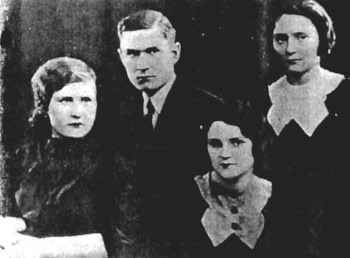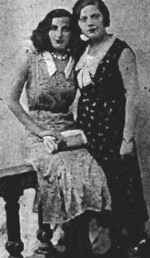 |
 |
|
|
[Page 116]
|
|
|||
|
|
|||
|
|
|||
[Page 117]
|
|
|
|
|||
|
|
|||
[Page 118]
|
|
|
|
[Page 119]
|
|
Sitting from right to left: Yehudit Berkovich, Tova Goldman, and Malka Trostiantsky Standing: Yosef Berkovich, Boris Berkovich, Milya Goldman, Mark Berkovich, and Leibish Trostiantsky. 1965 |
Hebrew/Russian text:
The Story of Sonya Kogan (Konstantinovsky), her husband, Moshe, and their daughter, Tsila, z”l
Kiliya resident Sonya Kogan (Konstantinovsky), born in 1909, her husband Moshe, and her 8-year-old daughter Tsila died in the Holocaust in Russia. When the war started in 1941[1], they gathered their belongings (whatever would fit in the wagon), left their little village of Gặnceṣti (Bessarabia), and fled eastwards. In one of the Moldavian villages, they were attacked by robbers, who stole all their belongings, including the horses and the cart. What could the defenseless family do? They had to give over everything they had and beg the robbers for mercy. The robbers tied them up and threw them in a shed. After a few hours, Moshe succeeded in escaping from his confinement and ran toward a retreating Soviet Army unit to ask for help. A Soviet officer sent a few soldiers to help them, and the soldiers got their belongings back to them and helped them get back on the road. The Kogan family traveled with the unit, and they went eastward. We do not know their exact route, but according to Moshe Kogan's sister-in-law Polly, who learned about their fate from a townsman who was also traveling with the retreating Soviet army, the refugees, including the Kogans, ended up in the Stavropol region, where they were killed by Fascist beasts.[2]
We never saw our dear sister Sonya ever again. On the monument erected for our mother, Brana Konstantinovskaya, in Akerman, we put a plaque to remember our sister Sonya, her husband Moshe, and her daughter Tsila.
By TABA GOLDMAN[3] (KONSTANTINOVSKAYA), December 1990, Haifa
To our deepest regrets, Taba Goldman only lived six months in Israel. She passed away from a heart attack in March 1991.
[Page 120]
|
|
|
|||||
| Aharon and Olya Konstantinovsky a few months before Lionya left for Eretz Israel. Aharon was the third son of Volf Konstantinvovsky. In 1910, still very young, he brought to Kiliya the first printing press. In the same year, together with Nesya Kogan, he brought the first silent movie projector. In 1912, he married Olya Berson from Odessa. He stayed in Odessa from 1917 to 1924, when he returned to Kiliya. He was elected to the Jewish Community Council four years in a row. He had a great voice and was invited to sing the prayers on High Holidays at the synagogue. His style was very original. He was inspired by the great cantors Cabertin and Pini Minkovski and by the operas he saw in Odessa. He used the opera music in the High Holiday prayers. | 1924: Aharon and Olya Konstantinovsky and their two sons, Liusya and Lionya, on their way from Odessa to Kiliya. In July 1927, half a year after his Bar Mitzvah, Liusya drowned in the Danube. | Aharon and Olya were born in 1885 and 1890. In this picture, they are in their fifties. After their son's tragic death, they became sick, and in this picture, they look much older than their ages. They were murdered in the fall of 1941. The Nazis found them in a village near Nikolaev and killed them. They were not brought to rest in Israel. |
|
|
| Idis Belnek (Konstantinovsky), the only daughter of Volf Konstantinovsky, married Baruch Belnek from Chimishliya (Cimiṣlia). In this photo from 1936 with sons: Meka and his wife, Yziya, who was killed on the Stalingrad front and daughters Polya and Chana. Another daughter, Tova, went to Eretz Israel. |
Translator's Footnotes:
|
|
JewishGen, Inc. makes no representations regarding the accuracy of
the translation. The reader may wish to refer to the original material
for verification.
JewishGen is not responsible for inaccuracies or omissions in the original work and cannot rewrite or edit the text to correct inaccuracies and/or omissions.
Our mission is to produce a translation of the original work and we cannot verify the accuracy of statements or alter facts cited.
 Kiliya, Ukraine
Kiliya, Ukraine
 Yizkor Book Project
Yizkor Book Project
 JewishGen Home Page
JewishGen Home Page
Copyright © 1999-2025 by JewishGen, Inc.
Updated 30 Jul 2023 by JH